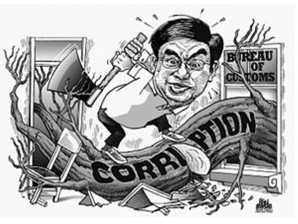As late as March this year, the Bureau of Customs was still perceived as a corruption-riddled government agency, ranking fifth in a Pulse Asia survey of offices that Filipinos singled out for incidents of graft.
Newly appointed Customs Commissioner Rozzano Rufino Biazon’s goals for the agency therefore bode well, if he pushes these to the hilt, for the raising of revenues that the government should use for public service, and the prevention and suppression of smuggling and fraud, among others.
Biazon’s first two goals, restated in his visit to Cebu last week, are internal. These include a review of the bureau’s systems and procedures and upgrading of computer systems.
These goals should address concerns raised by Cebu’s traders about the multiplicity, indeed redundancy of law enforcement groups helping the bureau fulfill its role. Too many hands working in the bureau no longer demonstrate concerted effort to help it but instead reinforce the suspicion that the bureau, with its lucrative collections, attracts crocodiles in the government.
Biazon’s third goal is to enjoin media practitioners as watchdogs to ensure that Customs workers faithfully fulfill their duties.
Does this mean that the sun is definitely setting on the legendary Customs collection practices of the unscrupulous who were audacious enough to count themselves among legitimate media workers?
We certainly hope so. Working with the media to ensure clean Customs operations is a creative twist that can in one fell swoop root out both Customs graft and a form of media corruption.
An efficient and transparent Bureau of Customs translates to hole plugged in the nation’s coffers.
In the meantime, Biazon’s bureau needs to see itself not only as a partner of exporters who complained about the smuggling of our seashells to Chinese and Korean shell craft traders but also as co-protectors of the environment.
At the heart of the issue is not the access of local businessmen to raw materials for shell craft but the protection of our seashells and other natural resources from those who are incapable of seeing them as more than just convertibles to cash.
Businessmen in the shell craft industry have sounded the alarm on the pillage of our shells. What of the resources used in other industries?
If the Bureau of Customs does not keep a watchful eye on what we have, we will soon wake up with nothing left because our tolerance for neighbors who steal, not to mention locals who hoard.
